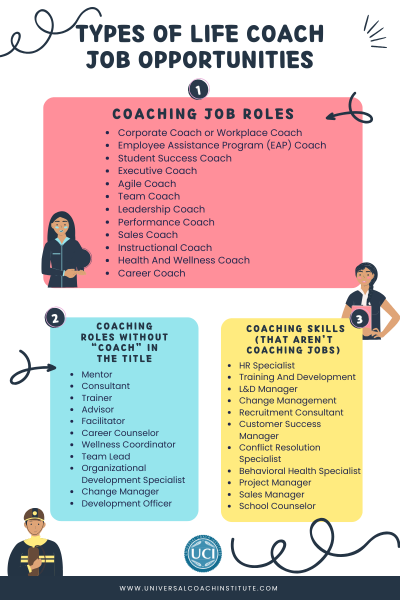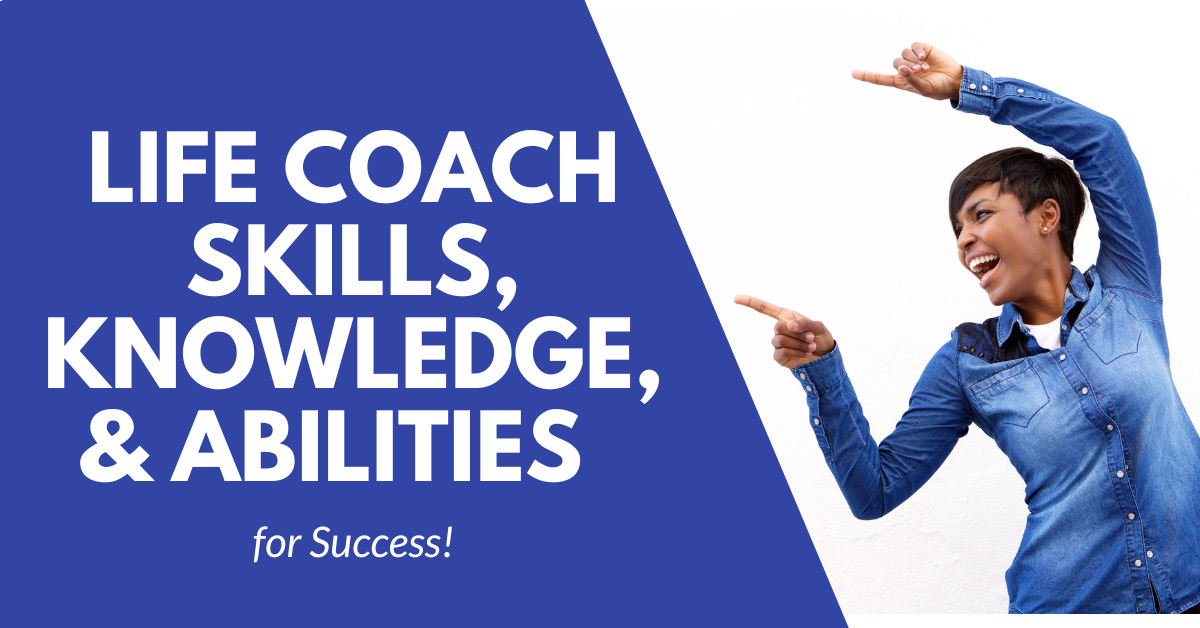Recently, I’ve been receiving a lot of inquiries about finding a job as a life coach. Life coaching is a growing field with a variety of career opportunities. While most life coaches start their own businesses and work with clients directly, others work for and contract with organizations. Some coaches even work in career fields that utilize their coaching skills but have different titles.
In this post, I will outline the types of jobs available for life coaches and share the roles I have worked in for the past couple of years.
In This Post
Types of Life Coach Job Opportunities
Life coaches can work in various settings and specialize in different areas. When searching for job opportunities, you might notice that the term “life coach” is not commonly used in job titles. This is because life coaching is not a typical position employers advertise for; most life coaches are self-employed entrepreneurs. However, there are organizations that do hire coaches, even if they don’t specifically label the roles as “life coach.” Don’t lose hope in your job search—there are opportunities out there.
Here are some coaching roles you can do as a life coach:
Corporate Coach or Workplace Coach
Corporate coaches work with employees in companies. They help staff set goals, manage stress, and improve work-life balance. These coaches often run workshops and one-on-one sessions.
They might focus on:
- Time management skills
- Communication techniques
- Leadership development
- Team building
Requirements may include a coaching certification or ICF accreditation.
Many big companies hire corporate coaches to boost employee satisfaction and productivity. This role can be full-time or part-time.
Employee Assistance Program (EAP) Coach
EAP coaches help employees deal with personal and work-related issues. They offer short-term counseling and support.
EAP coaches may help with:
- Stress management
- Work conflicts
- Family problems
- Substance abuse
Requirements may include a coaching certification or ICF accreditation.
Many companies provide EAP services to their staff. These coaches often work for EAP providers or directly for large organizations.
Student Success Coach
Education coaches work with students to improve their academic performance.
They help with:
- Study skills
- Time management
- Goal setting
- College planning
These coaches may work in:
- Schools
- Colleges
- Private tutoring centers
- Online education platforms
Requirements may include coaching skills or coaching certification.
Some focus on specific groups like high school students or adult learners. They aim to boost student confidence and success.
Executive Coach
Executive coaches work with high-level business leaders. They help improve leadership skills and business performance.
Areas of focus include:
- Strategic thinking
- Decision-making
- Communication
- Work-life balance
Requirements may include an Executive Coach Certification or ICF accreditation.
These coaches often have business backgrounds. They may work independently or for consulting firms. Executive coaching can be a lucrative field with high-profile clients.
Agile Coach
Agile coaches help teams and organizations adopt agile work methods. They focus on improving efficiency and collaboration.
Key responsibilities include:
- Training teams on agile principles
- Facilitating agile ceremonies
- Helping remove workflow barriers
- Promoting continuous improvement
Requirements may include agile coach training and agile certification.
Agile coaches often work in tech companies or IT departments. Some are full-time employees, while others are consultants.
Team Coach
Team coaches help teams work better together.
They focus on improving:
- Communication
- Conflict resolution
- Goal alignment
- Team dynamics
These coaches may work in:
- Software development
- Marketing
- Human resources
- Sales
- Operations
Requirements may include job experience, coaching skills, or coaching certification.
They often use team-building exercises and group sessions. Some team coaches specialize in specific types of teams or industries.
Leadership Coach
Leadership coaches work with individuals in leadership roles or those aspiring to become leaders. They help develop leadership skills, address challenges, and improve overall effectiveness.
Leadership coaches may focus on:
- Emotional intelligence
- Decision-making skills
- Organizational change
- Personal leadership style
Requirements may include coaching skills, training, and experience in leadership roles.
These coaches may work in corporate settings, nonprofits, or government agencies.
Performance Coach
Performance coaches help individuals and teams reach their highest potential. They work on identifying strengths, overcoming obstacles, and setting clear goals.
Performance coaches may help with:
- Productivity
- Procrastination
- Focus and resilience
- Goal setting
Requirements may include job experience in performance improvement.
These coaches may work with professionals, athletes, or creatives. They may operate independently, through coaching firms, or in specific industries.
Sales Coach
Sales coaches help sales professionals and teams improve their skills and achieve better results. They provide guidance on strategies to increase revenue and build stronger client relationships.
Sales coaches may focus on:
- Sales techniques
- Confidence in pitching
- Handling objections
- Client relationships
These coaches may work with:
- Corporate sales teams
- Small business owners
- Entrepreneurs
Requirements may include experience in sales and coaching skills.
Sales coaches help individuals and teams meet their goals and succeed in sales.
Instructional Coach
Instructional coaches work with educators to improve their teaching practices and enhance student outcomes. They provide support, feedback, and strategies to help teachers succeed in the classroom.
Instructional coaches may focus on:
- Curriculum planning
- Classroom management
- Teaching strategies
- Student engagement
These coaches often work in:
- Schools
- Colleges
- Educational organizations
Requirements may include teaching experience, coaching certification, and advanced education degrees.
Instructional coaches play a vital role in helping educators grow and create positive learning environments.
Health And Wellness Coach
Health and wellness coaches help people make positive lifestyle changes.
They work on areas like:
- Nutrition
- Exercise
- Stress reduction
- Sleep habits
These coaches often work in:
- Gyms and fitness centers
- Healthcare settings
- Private practice
Requirements may include a health coach certification.
They may team up with doctors or nutritionists. Some health coaches specialize in specific areas like weight loss or chronic disease management.
Career Coach
Career coaches help people with job searches and career growth.
They offer guidance on:
- Resume writing
- Interview skills
- Career planning
- Job market trends
Career coaches may work:
- Independently
- For career centers
- With outplacement firms
- In human resources departments
Requirements may include career counseling experience, coaching skills, or career coach certification.
They often help people change careers or re-enter the job market. Some specialize in certain industries or job levels.
Coaching Roles without “Coach” in the Title
Some positions are coaching jobs but may have different job titles. I have created a list of these roles to assist in your job search. Please note that these positions will require relevant or specialized job experience.
- Mentor
- Consultant
- Trainer
- Advisor
- Facilitator
- Career Counselor
- Wellness Coordinator
- Team Lead
- Organizational Development Specialist
- Change Manager
- Development Officer
Jobs You Can Get With Coaching Skills (That Aren’t Coaching Jobs)
Coaching skills can open doors to many careers beyond traditional coaching roles. These skills are valuable in fields that involve guiding, supporting, and developing others.
- Human Resources (HR) Specialist
- Training And Development Specialist
- Learning And Development (L&D) Manager
- Change Management Consultant
- Recruitment Consultant
- Customer Success Manager
- Program Manager (Leadership Or Wellness Programs)
- Mediator Or Conflict Resolution Specialist
- Behavioral Health Specialist
- Project Manager
- Sales Manager Or Consultant
- Educational Counselor Or Advisor
How To Find Coaching Job Opportunities
Finding job opportunities requires using online resources, building connections, and exploring various sectors. These strategies can help you discover openings and launch your career.
Company-Specific Opportunities
Many companies hire coaches for their employees. Look for openings in:
- Human resources departments
- Employee wellness programs
- Corporate training divisions
Check the career pages of large corporations, tech companies, and startups. They often value employee development and may need coaches.
Consider contacting companies directly, even if they don’t have current openings. You can introduce yourself and express interest in future opportunities.
Government And Nonprofit Listings
Government agencies and nonprofits sometimes hire life coaches. Check these sources for job listings:
- USAJobs.gov for federal positions
- State and local government job boards
- Idealist.org for nonprofit roles
These jobs might focus on career coaching, health coaching, or helping specific groups like veterans or at-risk youth.
Look for positions at community centers, schools, and healthcare facilities. They may need coaches to support their staff or clients.
Don’t overlook grant-funded programs. They often hire coaches for short-term projects or initiatives.
Job Boards And Platforms
Online job boards are a great place to start your search. Popular sites like Indeed, LinkedIn, and Glassdoor often list coaching positions.
These sites let you filter by location, experience level, and specialty. You can set up job alerts to get notified about new postings. Make sure your profile and resume are up-to-date before applying.
Don’t forget to check social media too. Many companies post job openings on their Facebook, Twitter, or Instagram pages.
Networking
Building connections is key in the coaching world. You can network by:
- Joining professional coaching associations
- Attending industry conferences and workshops
- Participating in online forums and groups
Local meetups and events are great for meeting other coaches and potential clients. You might hear about job openings that aren’t advertised publicly.
Try reaching out to experienced coaches for informational interviews. They can offer advice and might know of job opportunities.
Qualifications And Skills Employers Look For
Employers seek specific qualifications, experience, and skills in candidates. These help coaches guide individuals effectively and build successful careers.
Certifications
Some employers want coaches with professional certifications from coaching schools such as the Universal Coach Institute or accreditations from voluntary organizations such as the International Coach Federation (ICF), the European Mentoring and Coaching Council (EMCC), or the International Association of Coaching (IAC).
You can earn these by completing approved training programs and coaching hours.
Degree
Some employers may accept degrees in psychology, counseling, or related fields instead of coaching certifications. A degree in business or management is required for Leadership and Executive Coaches.
Specialized Training and Certification
There are also job roles that require specialized training and certifications. Examples are Agile, Leadership, Executive, and Sales Coaches. Having multiple certifications can make you stand out to employers.
Relevant Experience
Employers value hands-on coaching experience. You can gain this through:
- Internships with established coaches
- Volunteer coaching for nonprofits
- Paid coaching clients as a freelancer
- Mentoring programs at work or school
Keep a record of your coaching hours and client outcomes. Employers often ask for this information.
Past work in HR, counseling, or teaching can also be helpful. These jobs use similar skills to coaching.
Coaching Skills
Life coaches need strong people skills to succeed. Employers look for:
- Active listening
- Empathy
- Clear communication
- Patience
- Motivation
Problem-solving and goal-setting abilities are crucial, too. You should be able to help clients overcome obstacles and achieve their aims.
Organizational skills help you manage multiple clients and tasks. Being adaptable is important, as each client has unique needs.
Self-awareness and emotional intelligence are key. These help you understand your own biases and connect better with clients.
My Roles Over the Past Few Years
For the past few years, I have been working as an Agile Coach. As an Agile Coach, I assist software development organizations and teams in implementing agile methodologies for software development.
I’ve also worked as a leadership coach, training and coaching individuals on how to lead and use leadership skills in their management positions.
Take Home
Becoming a life coach opens the door to many opportunities. You can work in different settings like corporations, schools, or even your own private practice. Many coaches specialize in specific industries or niches like career, health, or business. They create a path that fits their passion.
To get started, you’ll need proper training and certification. You must also build a strong personal brand and network and market yourself online and offline.
The demand for coaches is growing as more people and organizations seek assistance in reaching goals. As a coach, you have the chance to make a real difference.
Success doesn’t happen overnight, but with a commitment to your own growth and learning, you can create a fulfilling career helping others. Stay focused, and remember—it’s worth it!




